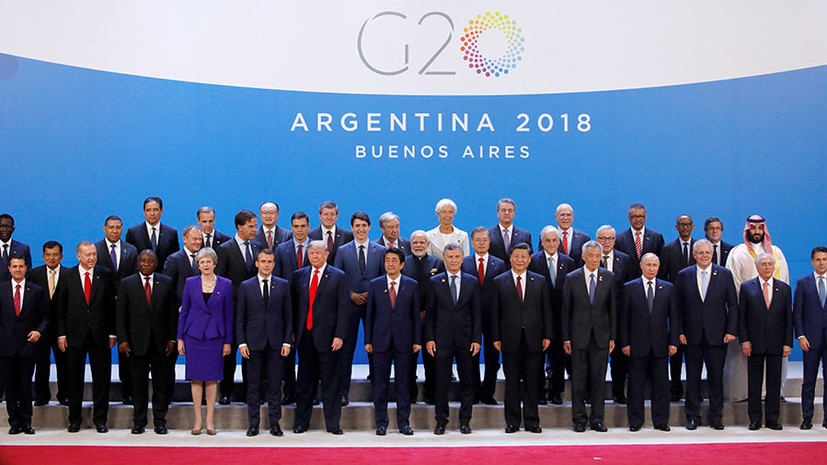The G20 summit in Buenos Aires showed the uncertainty and chaos of the existing world order. The political situation around the summit perfectly corresponded to this atmosphere: Donald Trump disrupted a planned meeting with Vladimir Putin after a Ukrainian provocation in the Kerch Strait, and the head of France was forced to go to the event with an eye to the mass protests in the country against the rising gasoline prices. However, this tension is best conveyed by the fact that at the most crucial moment even the flawless German technology failed, when German Chancellor Angela Merkel was late in the best traditions of Italian meetings with friends due to the breakdown of the government airliner.
The apparent fragmentation of the political landscape was manifested in the fact that the G20 summit almost constantly turned into G2, where world leaders devoted more time to bilateral meetings, demonstrative (un) handshakes and other signals. It was rather curious to see how against the background of the scandal with the murder of Saudi journalist Jamal Hashukji in the territory of the consulate general in Istanbul, Turkish President Recep Erdogan and Crown Prince of Saudi Arabia Mohammed bin Salman tried to overlook each other. But the eastern tricks, of course, faded compared to how the media tried to emphasize the "personal confrontation" of Trump and Putin. As if feeling the need to lower the degree, at the end of the summit, Russian President Vladimir Putin emphasized that, despite the external negative background, he was able to communicate with the leader of the United States in an express format and speak on the Kerch crisis issue. Nevertheless, the disagreements of the two countries exist, and they are more fundamental than the level of the Ukrainian incident, and even more complicated than clashes on the field of sanctions subjects.
The political content of the G20 highlighted the fact that the world is fragmented. The main topics were the issues of the world economy, trade and protectionism. It turned out that the rules of the game are changing too quickly and the countries are no longer keeping pace with new challenges. Life as before becomes more difficult, but the image of the future is not yet. Old alliances are falling apart. It was this moment that they tried to fix in the final statement of the “Big Twenty”. In practical terms, this resulted in a discussion about the need to reform the WTO. But the main question remained unanswered: how far should go in such a reform? And here an important geopolitical rift is found - on political radicals and conservatives.
The first is Donald Trump, who “sacrificed” his sympathy for the Russian leader in order to try to impose his agenda on a tough version of structural reforms. We have already seen how earlier Trump easily abandoned the Trans-Pacific Partnership and a similar agreement with the EU, which for a long time was worked out by his predecessor Barack Obama. Following the desire to change the overall balance in their favor, the United States is acting alone on key trade partners - Mexico, Canada, China, the EU. At the G20 meeting, it was the Middle Kingdom that was under heavy pressure. Not surprisingly, The Washington Post called Trump and Xi Jinping’s negotiations “extremely successful”, where China agreed to reduce its trade surplus in relations with the United States and was forced to immediately start buying American agricultural products and other manufactured goods.
With the revision of the rules of the WTO, a similar fate can be expected in other countries.
However, a different configuration of the WTO may, on the contrary, protect world trade from the hegemony of a single player. To do this, you do not need to greatly change the rules of world trade, but only to make certain amendments to the already established format of international relations. Informally with such a proposal and the head of the Russian Federation Vladimir Putin spoke at the G20, and the attentiveness with which other major players listen to him (France, Germany, Turkey, Japan) suggests that such a conservative approach is seen by many countries as a more attractive alternative to the unambiguous domination of the USA . An indirect evidence of this is the G20 participants' defense of the Paris climate agreement, which is strongly opposed by the United States and Trump personally.
The G20 Summit in Buenos Aires gave each side the opportunity to feel the alignment of forces and the mood of the minds. The radicals and conservatives of world politics got the necessary time to deal with internal problems. No one wants to risk right now, but it is obvious that in the medium term we will see more than once how gradually the issue of revising current trade relations in world trade will be raised in one form or another by leading players. Only time will tell whether this will lead to conflicts / turbulence or mind / evolutionary approach will be able to pave the way.
The point of view of the author may not coincide with the position of the editorial board.

